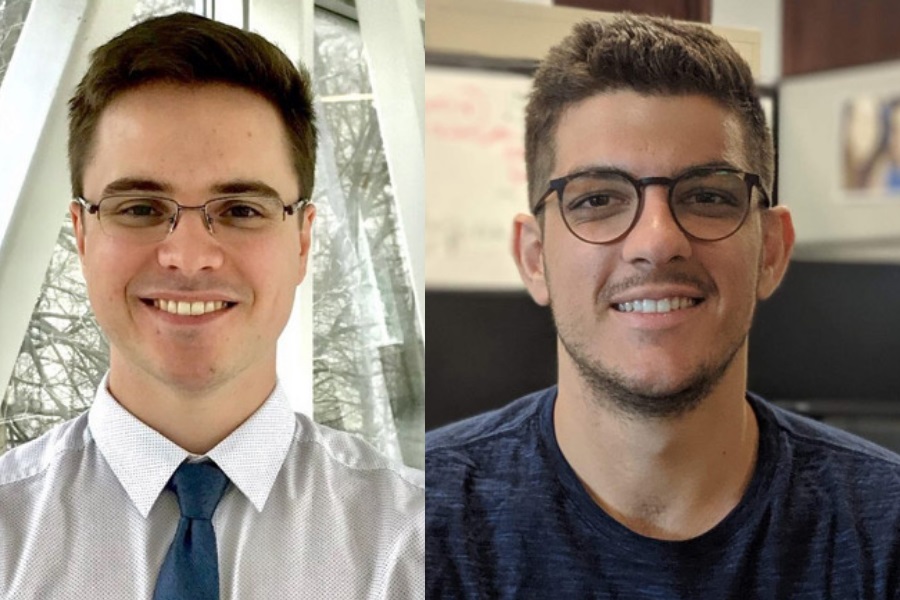A helping hand for innovation
Drawing a record number of entries, the Proteus Innovation Challenge celebrates and accelerates commercialization strategies of promising technologies coming out of Ontario institutions
Photo: Vladyslav Podskalniy and Jacob DiCarlo from Team MacWest, one of the 2020/2021 Proteus Innovation Challenge winners
FIFTY-SEVEN TEAMS COMPRISING more than 190 individuals vied for the five top prizes at this year’s Proteus Innovation Competition – more than any other year in the contest’s six-year history.
Teams overcame the challenges brought on by the pandemic and competed virtually, creating abstracts and business plans, then making pitches to a panel of judges.
Founded at Western by WORLDiscoveries and grown to collaborate with McMaster, Windsor, Waterloo, Guelph and Wilfrid Laurier universities, the competition brings students together to propose viable paths to market for novel technologies developed at the partner institutions.
It’s a key event within the Western Entrepreneurship ecosystem, awarding each winning team $5,000 and the chance to license the new technology and form their own startup.
Story Continues Below
“Proteus highlights so many things from our regional innovation community,” says Souzan Armstrong, interim executive director of WORLDiscoveries. “It creates a learning opportunity for all participants interested in entrepreneurship. It brings interdisciplinary people together to work on a common goal, and it has the potential to bring technologies developed right here in Southwestern Ontario to market for the improvement of society.”
This year’s winners came from across the country, with some contestants participating from as far away as Alberta. Many Western students also performed well in the business plan and pitch phases of the competition.
Team MacWest, composed of Schulich dentistry student Vladyslav Podskalniy, BMSc’19 and McMaster alumnus Jacob DiCarlo, won for their commercialization plan for a muscle-training and recovery device developed at the University of Guelph. The apparatus features simultaneous blood flow restriction and electrical muscle stimulation and has applications for professional athletes’ training and recovery as well as for patients recovering from surgery or traumatic injury.
As longtime friends, Podskalniy and DiCarlo found the Proteus Competition a great way to stay connected during the pandemic. They enjoy working on business projects together, and saw the competition as a learning experience.
“Given the circumstance with Covid, I wanted to take a step forward into business education,” says Podskalniy. “The call for submissions for Proteus came at the right time. It seemed very exciting to be in a position to take a new piece of technology to market.”
Story Continues Below
Podskalniy’s medical and dental background, along with his and DiCarlo’s passion for endurance sport, made their choice of the muscle-training technology a natural fit.
“When reading through the technologies, the muscle-training and recovery device really stuck out for us because it was something that had limitless applications both in health care and in retail,” says DiCarlo, an engineer. “Additionally, Vlad and I are both athletes, so we were organically drawn to the fact that this technology was an emerging trend in the sports fitness space.”
Team MacWest is interested to see where this technology can go, and seeks to work with the inventor toward licensing opportunities and a potential startup company.
The 2020/2021 Proteus Innovation Competition winning teams are:
Team CAD15 Consultants: For its commercialization plan for a pain measurement application developed by Western’s Dave Walton. Team members: Connor Buffel, Kevin Parker.
Team RubberCycle: For its plan to commercialize the recycling of vulcanized rubbers through an organic polymers process developed by researchers at McMaster University. Team members: Ryan Krause (Ivey), Matthew Fung (Schulich Medicine & Dentistry), Anusha Samarabandu (Engineering), Irene Zhu (Brescia).
Team vGen Solutions: For its commercialization plan for forming multiple disulfide bonds in a peptide process developed by John F. Trant’s lab at the University of Windsor. Team members: Connor Holmes (BMOS), Farshad Murtada (Health Sciences), Rick Sugden (Health Sciences), Jason Liu (Ivey).
Team MacWest: For its plan for the muscle training and recovery device developed by Jamie Burr at the University of Guelph. Team members: Jacob DiCarlo, Vladyslav Podskalniy (Schulich Medicine & Dentistry).
Team BioGryphs: For its plan for the phytotoxicological field-based monitoring device developed by Kevin Stevens at Wilfrid Laurier. Team members: Rebecca Bradley, Brooke Rathie. ![]() Jordan Flemming (Story courtesy of Western University)
Jordan Flemming (Story courtesy of Western University)

